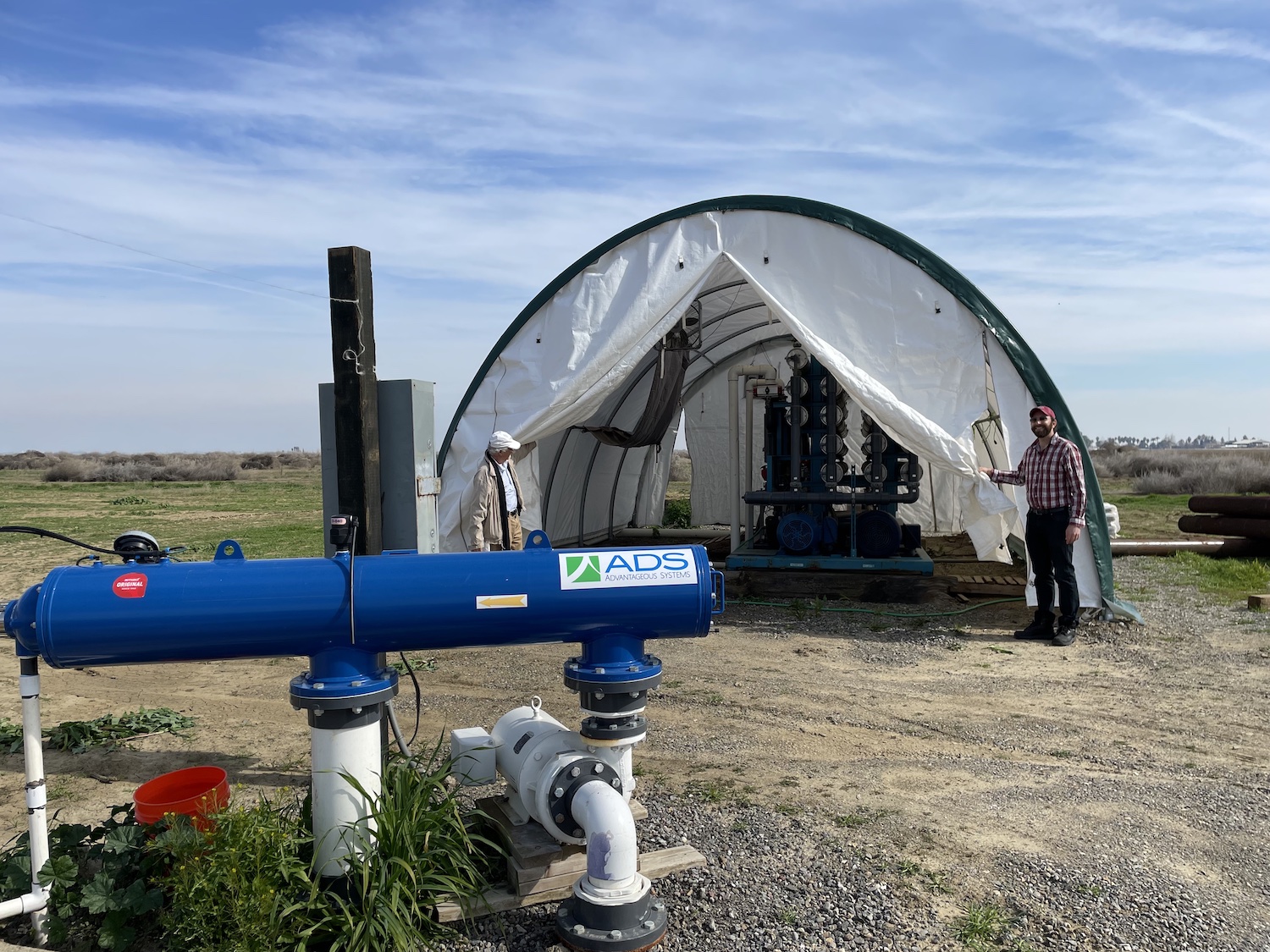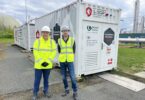The wells of central California are the main water source to sustain agriculture in the region, but the brackish water contains high concentrations of total dissolved solids (TDS) in general, and geologically occurring recalcitrant elements – like boron – in particular. Boron is hard to remove using membrane technology such as Reverse Osmosis, and Ion Exchange is quite burdensome in cost, complication and footprint. Boron, while not a health hazard, can have unwanted consequences for tree health and yields. Farmers may want to reduce salinity of their wells for irrigation, and they typically use conventional reverse osmosis and ion exchange, but brine production, fouling of membranes, lack of adequate boron reduction, and high cost-of-application continue to hinder the use of treatment technology for well water meeting suitable quality for agricultural use.
ADS’s magnetic particle treatment (MPT) adsorption system is the first-of-its-kind non-membrane technology to selectively remove contaminants with minimal energy consumption. The technology utilises synthetic small molecule receptors, coupled to magnetic particles, to bind and remove contaminants of concern from water. Developed from blood diagnostic technology, the device comprises four steps.
Firstly, particles are introduced into the influent using a hopper/auger. Next, a static mixer mixes the solution to ensure adequate residence (a few minutes). Then, bound particles are removed using a permanent neodymium magnet. Finally, the particles are recycled via chemical means.
The waste stream of the ADS system, a purified form of the chemical used for recycling combined with the target constituent removed from the water, can potentially be reused or sold. The process can selectively remove contaminants found as trace elements such as arsenic, selenium, perchlorate, boron, or those found in larger quantities such as nitrate, sulphate and TDS. The receptors selectively bind to the desired constituent and can, therefore, be tailored for specific applications.
The purification system is a reusable, specific, and relatively inexpensive technique which dramatically reduces toxic brine and eliminates fouling of membranes, whilst reducing electricity demand, thereby reducing the cost and carbon footprint of water purification.
Aims of the pilot trial
Advantageous Systems (ADS) and Linneman Ranches embarked on a pilot trial focusing on well water treatment for agricultural utilisation, selectively removing boron upstream of a reverse osmosis system.
Linneman Ranches produce tree nuts, mainly almonds; the orchards are irrigated during the dry seasons using borehole / well water. This pilot trial aimed to drastically lower the electrical energy demand of water treatment whilst maintaining the treated water quality.

The ADS MPT system for this trial uses micro- or nano-sized magnetic particles with receptors that are selective to boron. It was used in conjunction with reverse osmosis.
This is comprised of three main components:
- Injection of magnetic particles.
- Residence time or mixing of particles with water.
- A magnetic removal system that uses permanent magnets to separate the particles (That now have the trace elements attached to them) from the water without needing a lot of pressure or energy.
This trial used the MPT system to selectively remove boron upstream of a reverse osmosis system, removing the need for double pass RO.
This unique trial aimed to lower electrical energy demand of the RO by eliminating the need for a second pass membrane typically needed for low pressure brackish RO for high boron reduction. The high concentrations of geologically occurring boron needed to be lowered to 1.5-2.0 ppm to meet the tolerance levels of the crops. Moreover, the trial aimed to drastically lower the electrical energy demand during the water treatment process, without compromising the treated water quality.
At the start of the trial, it was discussed that if successful, and Linneman Ranches became able to treat their own water to a suitable standard, they would be permitted to give it to the water district in exchange for water credits. These water credits can be used on their own properties in the district or traded with other farmers in the district.
Successes of the trial
The trial gained successful results meeting all its targets. All farm needs for water quality and volume were met, and the MPT system now saves between 35 and 50% of the energy consumption by replacing the old two stage or double pass reverse osmosis system with MPT and single pass RO.
Additionally, further successes within the trial were achieved:
- The trial system treated a feed flow of untreated well feed water at a blended rate of 2,000 gallons per minute (7.47 m3/minute).
- Treated water met the targets for TDS, boron, chlorides and sodium
- The trial achieved an average energy saving of 510 kWh p/m at the site, equivalent to averting 0.23 tonnes CO2e emissions p/m.
- Over 90% of feed water is treated water, and less than 10% is rejected wastewater.

What’s next for ADS systems
Throughout the success and participation of this trial ADS gained vital information from actions that perhaps, didn’t quite go to plan. For instance, Advantageous Systems CEO, Adam Stein stated,
“The well sometimes had some cavitation issues, and some start-up issues, the energy demand on that location also didn’t have enough amperage so we were forced to use a generator for some of the time, and we would have preferred to use a solar generator.”
Gaining these experiences through the project has encouraged ADS to create a solar generator ready for the next installation of a full system.
This tried and tested system provided greener, better, cheaper and faster results that will positively impact the water treatment and agricultural industry.
Greener- Energy savings of 35-50% mean fossil fuel utilisation for purchased power is slashed by one third to a half.
Better- Greater trace elements and toxic metal removal compared to other well water treatment systems.
Cheaper- Without the use of heavy equipment, electricity or other pre or post treatments the MPT technology is cheaper water treatment than conventional treatment.
Faster- With an almost immediate residence time and no pre or post treatment requirements, the ADS technology represents the quickest selective water treatment technology worldwide.
Additionally, local neighbours of the Linneman Ranches have been to visit this new system and are all lining up for their own, creating a pipeline of farmers who are interested in their own MPT system!
The Trial Reservoir is proud to have been involved in this amazingly successful pilot trial and can’t wait to see what the future holds for ADS, specifically this trialled technology.
For more information on the Trial Reservoir visit: isleutilities.com/services/trial-reservoir
Related articles:
The four stages of wastewater treatment plants






